- Home
- John Barth
The Floating Opera Page 19
The Floating Opera Read online
Page 19
“The firm’s not turning it down,” I reminded him. “I’m just not interested personally.”
“Hell, man, it’s not like it’s an outright gift to you!” Wingate cried. “He just wants to hire you, like anybody else might do. What you want to hold him by the tail for? Nobody else ever got him so het up before!”
“He’s being childish,” I said. “He knows he’s not obligated to me. He even took the trouble to get it in writing.”
Wingate told me frankly I was a damn fool.
Word got around town (I suspect through either Wingate or Mrs. Lake or Jimmy) about the five thousand dollars, and I was asked about it by a few extra-curious people.
“It was just a gift,” I shrugged.
Most people, though, had already regarded me as rather eccentric, and so were pleased enough to have their suspicions confirmed. I heard through friends that one or two of Dad’s creditors were disgruntled, but of course the money was mine, not Dad’s, and so they could do nothing. Some cynics wondered what I was after.
On Christmas the Colonel sent me, via his chauffeur, a case of Harvey’s Scotch. When he got it back two days later, via the Cambridge Cab Company, he came again in person to my office.
“Good morning, sir,” I said. “What can I do for you?”
“You can quit this damn nonsense!” the Colonel said heartily. I offered him a cigar, which he refused almost violently. I waited for him to continue.
“Do you still mean to sit there and swear to God you gave me five thousand dollars out of a clear blue sky for nothing? With times as hard as they are?”
“It was a gift,” I said.
“Don’t think I don’t know why your father committed suicide, young man,” the Colonel said. “No offense intended; you know how these things get around.”
“That’s right.”
The Colonel sighed impatiently and tapped his cane on the floor. “I don’t get it,” he said.
“There’s nothing to get.”
“Listen,” he said, rather quietly. “This needn’t go beyond the two of us. Wingate Collins—you know him? Good. Wingate Collins is my vice-president unofficially in charge of labor relations. Good man, Wingate, but he’s doing a lousy job. Makes everybody mad, and he’s supposed to make everybody happy. Union doesn’t like him, office people don’t like him, I don’t like him. Great fellow, you know, but makes folks mad. Well, then. Wingate’s going to retire soon—he don’t know it yet—and I’m going to hire a labor relations man. Want a lawyer, somebody knows people. Take you half a day, five days. Five thousand a year, and you can keep your law practice on the side.”
“Nope.”
“Listen,” the Colonel said. “This isn’t any gift. I don’t know anybody else I’d rather hire. I’m just glad I got to know you.”
“Thanks,” I said. “I don’t want the job, sir, thank you just the same.”
“Don’t want it!” the Colonel cried. “Men are begging for work! Don’t want it!”
“No, sir.”
“Yes!” the Colonel shouted, forgetting himself. His face was red.
“Nope,” I said again.
“Take your damn money back!” the Colonel cried, but waved no bills under my nose.
“Of course not.”
The Colonel actually mopped his forehead with his handkerchief.
“How about the Scotch?”
“No thank you, sir,” I said.
He rose to leave, shaken.
“I shall have a great many guests in on New Year’s Eve,” he said softly. “You’ll get an invitation; Mrs. Morton has already sent them out. It’s her first big affair, and she’s heard of you but hasn’t met you.” The Colonel had remarried perhaps a year before, his first wife having died in 1926.
“Thank you,” I said.
“You needn’t take the trouble to send it back, as you did the Scotch. There’s no need to insult Evelyn. Just throw it in your wastebasket.”
I did indeed get the engraved invitation next day, and on New Year’s Eve, having drunk four double highballs in my room after supper, I decided to drop in on the Colonel’s party, thinking it consistent with my policy of incomplete consistency. At eleven o’clock I took a cab out to the Morton estate on Hambrooks Bay.
The party was in full swing when I arrived. Both wings of the great brick house were bright, and perhaps a hundred and fifty people milled around inside, in tuxedos and gowns. I wouldn’t have thought that there were that many tuxedos in Dorchester County. A champagne fountain had been rigged up in the main living room, and a sparkling burgundy fountain in the library. The women were drinking mostly from these. On the summer porch three white-coated Negroes tended bar, and male guests stood two deep before them. A small orchestra was playing in the basement.
The butler took my coat and my invitation at the door, but before he could do anything with the latter, the Colonel caught sight of me from across the room, where he stood laughing with some vice-presidential-looking friends. He stared for a moment, took the cigar from his mouth, and then broke into a great smile.
“Well, well, well!” he roared, charging toward me with hand extended. “Andrews!” He could think of nothing to say, and so pumped my arm for a minute.
“Well, well, well!” he roared again.
“Looks like a pleasant party,” I declared.
“Well!” the Colonel said. “Ha! Say, you must meet Evelyn. Evelyn! Evelyn!”
Evelyn appeared from the library, near at hand. She was perhaps forty-more than half the Colonel’s age—and, perhaps because she’d borne no children, her figure was still slender, and the skin on her face fairly tight She was much better-looking than her husband.
“Evelyn, this is young Andrews, Todd Andrews; the young lawyer, you know.”
“How do you do, Mr. Andrews.”
“Good evening,” I said.
“My husband doubted that you’d do us the honor,” Mrs. Morton smiled. I guessed that she was thoroughly enjoying her first big affair: her smile was a trifle liquorish.
“Ha!” the Colonel exclaimed, and still held fast to my arm, as though afraid I’d bolt. “He’s an independent young man, all right! Well, what say to a drink, Andrews? A little Scotch, eh? Ha!”
“I thank you.”
“I’ll be seeing you in a moment, Mr. Andrews,” Mrs. Morton said. “I certainly must get to know you while we’ve got you. Toodleoo!”
“Toodleoo,” I said.
“You’ve made her very pleased by coming tonight,” the Colonel confided as he marched me through the crowd to the summer porch. People turned to watch us go by.
Well, it was the first party of any size that I’d been to since my saintly days prior to Dad’s suicide, and I found myself reverting to that pose. As soon as I could escape the Colonel’s introductions to people I already knew—there were only ten or twelve strangers at the party—I garnered two double Scotches from one of the Negroes (whom I also knew well) and retreated to the darkened basement, which had been cleared out for dancing. An auxiliary, one-tender bar had been set up across from the orchestra, and so I was able to drink uninterruptedly for some time, watching the players and the dancers. And, truth to tell, I got splendidly drunk on the Colonel’s Scotch.
What followed I must tell in broken sequences, for that is how I remember it:
At midnight the place went to hell, as though every guest—there must have been two hundred then, or else all were in the basement—had decided simply to throw back his head and holler at the top of his lungs for several hours. The orchestra played on, but without audible effect, and people danced brokenly to no music. For a while someone was kissing me, and I proposed to whoever it was that we fling our glasses into the fireplace, as one should.
“There isn’t any fireplace.”
“Into the noise, then.”
“You can’t hit noise, silly.”
“Regardez,” I said, and threw mine at the drummer.
I did indeed dance a tango with Evely
n Morton. Nay, ten, a dozen tangos, without the encumbrances of music or prior experience. And in every ill-lit corner, as his wife clung to me, I saw the Colonel smiling redly, benignly, nodding his great head, flashing his gold teeth, his gold-headed cane.
Certainly there was a floor show of drunken wives of vice-presidents, to the horror of some husbands. A cancan line. Remarkable. I recall vividly the upflung leg, the fat veined thighs of the wife of Wingate Collins, that marked man. The roaring went on, no matter how many glasses one threw at the orchestra, who played in terror. There is a picture of the drummer shielding himself behind a great cymbal, apparently carried for that purpose; of my thin, elegant highball glass glittering through the air to splinter against the wall just off his starboard ear. No matter whom one attempted to dance with, it was Mrs. Morton—slender, graceful, unattractive, drunk—and the Colonel nodded.
Then there was a tendency to take cold showers in several of the upstairs bathrooms. These showers were taken by gluts of singing men. My group sang verses of “Mademoiselle from Armentières,” and I recall even now the vibrancy of my baritone, but I don’t remember getting wet at all until the entrance of wet Mrs. Morton. Standing outside the shower, we had sung the line declaring that Mademoiselle had not enjoyed herself for forty years, and then between the hinkey and the dinkey my choir vanished, as in a movie, and shimmering, dripping Mrs. Morton leaped like a damp naiad from behind the shower curtain, into my arms. Her dewy bosoms, none too firm, crushed into my shirt front; her dripping hair fell over her eyes; her teeth sank into my lapel, into my boutonniere; she ground herself against my trousers. We danced a magnificent parley-voo, stopping with a dip that dropped us to the tiles, tapped by the tip of the Colonel’s cane. Mrs. Morton caught sight of the gold teeth glinting in the light from the bathroom bulb and swooned or died, sprawling pink and sprinkled like a blushing dugong hoist from the deep.
I picked myself up and straightened my wet bow tie. The Colonel grinned feverishly and tapped his cane (seven inches from his wife’s wet head) as though conversing with her spirit by Morse Code.
“Mrs. Morton dances well,” I said, bowing slightly to the Colonel as I stepped over Evelyn en route to the door. And then, parting, with what seemed to me a nice conjunction of wit and savoir-faire: “One might call her Morton’s Most Marvelous Tomato, mightn’t one? Good night, sir.”
One was, in fact, tempted to add that it was a pity to see such a fresh tomato stewed, as it were, if not altogether canned—but one knew the line beyond which the prick of wit becomes the sting of insult, and so held one’s tongue and exited gracefully.
In the new year that followed, the firm of Andrews, Bishop, & Andrews was not pressed to render its services to the Colonel, nor was I dunned with invitations to join clubs or lodges, nor confronted at every turn with invitations to parties and dinners at the Morton manor. Indeed, if there have been any parties at the Mortons’ since that New Year’s Eve, I’ve not heard of them. Jacob Matson, of Matson & Parks, became vice-president in charge of personnel for MMT, Inc., when Wingate Collins suddenly retired.
And on the rare occasions when I met Col. Morton on Race Street and tipped my hat in greeting, he flushed red, bared his gold teeth, and ignored me with the grim smile of one who is obligated in no way to any man.
XXII. a tour of the opera
At three o’clock, just after Bill Butler and Charley Parks had left my office, Jane Mack came in with her daughter. I heard Jane exchange greetings with Mrs. Lake, and then little Jeannine—three and a half years old now, and brown and lovely like her mother—came up to my desk and watched me shyly.
“Hi, Toddy,” she said.
“Hi, baby.”
“Honey, may I fix your pencil?”
“Sure.” It was Jeannine’s habit to sharpen pencils. I gave her a good long one, and she went happily to the sharpener and proceeded to grind away on it.
“Oh, my,” Jane said, coming into my office, “she’s happy now. How do you feel, Toddy? Any better?”
“Hello, Jane. I wasn’t sick.”
“Then why did you act so silly last night?” she asked, more softly, so that Mrs. Lake couldn’t hear. She perched on the corner of my desk. She was wearing khaki shorts—unusual for that year—and a blue cotton blouse, and looked quite fresh and desirable.
I smiled. “I guess I just wasn’t in the mood.”
She smiled back and patted me on the head. “That’s a stupid way to be,” she said. “I was in the mood.”
“I was, too,” Jeannine declared from the pencil sharpener.
“Maybe I’m getting senile,” I proposed. “Stamina was never my strong point, as you know.”
“I know your strong point,” Jane said. “Did you get my note?”
“I did.”
“You sent me a dumb one, so I thought I’d send you a dumb one.”
I smiled. “I don’t know what Marvin found wrong with me. He’ll bring the report around tonight, and we’ll look at it next time you’re up.”
I had certainly expected some astonishment at this news, but Jane, unlike Harrison, didn’t bat an eye.
“God knows it’s time you went to doctor,” she said. “Well—” She jumped off the desk. “I’ll be seeing you later at the house, won’t I? For a Manhattan? Try not to keep Jeannine right in the sun too long, if you can help it. She’s got that bonnet, but it’s awfully hot out.”
“All right.”
“I’ll be done at the hairdresser’s in an hour, if you want me to drop in and pick her up. If you’re finished before then and she gets on your nerves, pop her in a cab and send her home. She likes that. And for God’s sake buy her an ice-cream cone.”
“All right.”
“ ’Bye now, honey.” Jane kissed her daughter. “So long, Toddy.”
“ ’Bye, Mommy,” Jeannine said.
“So long,” I said, and she left. I was impressed: between the time in 1933 when I insulted her and the time in 1935 when we resumed our affair, Jane’s personality had strengthened in some ways; for one thing, she was unpredictable. I wondered with quite sharp interest what she intended to do about my note, now that I’d fulfilled the conditions of hers—and when it occurred to me that I’d not be alive to find out, I experienced a small sensation of regret; the only such sensation I felt that day.
“Let’s go see the showboat, honey,” I suggested to Jeannine, who by this time was pushing the last fragment of the pencil into the sharpener.
“All right, honey,” she said, and politely took my hand.
We went out into the bright sun and walked the dry block to Long Wharf, where the showboat lay immensely along the bulkhead. Unlike its Mississippi counterparts, Adam’s Original & Unparalleled Floating Opera was no architectural extravaganza of gilt and gingerbread. It was, by comparison with them, severely unadorned, for it had been built to withstand the tempestuous moods of Tangier Sound and the lower Bay, and even ventured into the Atlantic on occasion. The Opera itself was a long, narrow clapboard box mounted on a massive barge. On the bow was lettered S.S. Thespian, the vessel’s registered name, but down both sides of the clapboards, in red letters three feet tall, was emblazoned its less modest trade name. A simple balcony affair graced either end of the theater, apparently for the employees’ benefit, and lifelines ran down both sides. On the roof were ventilators, stovepipes, clotheslines, lifeboats, a trim little shed with window boxes and curtained windows, an improvised bandstand, and the steam calliope, now silent. The whole structure was braced against humping or buckling by a trusswork of piers and cables on both sides. Two tugboats moored alongside, the Pamlico and the Albemarle, provided the showboat’s motive power.
“What’s that, Toddy?” Jeannine asked excitedly.
“That’s a showboat,” I said. “Can you say showboat?”
“Showboat.”
“Would you like to go up close and see it?”
“All right.”
Fortunately, for I’d forgotten my promise, some entrep
reneur had set up a refreshment stand near the bulkhead, and so I was able to buy two vanilla ice cream cones before we went up for a close look at the showboat. Not many people were curious enough to come out in the terrific heat; we had the spectacle pretty much to ourselves, and I set Jeannine up on a piling to get a good view.
As was her habit when excited, Jeannine slipped into the “Why?” routine.
“What’s it for, Toddy honey?” she shouted, awed at the Opera’s size.
“It’s a showboat, hon. People go on it and listen to music and watch the actors dance and act funny.”
“Why?”
“Why what?” I asked. “Why do the actors act funny or why do the people like to watch them?”
“Why do the people?”
“The people like to go to the show because it makes them laugh. They like to laugh at the actors.”
“Why?”
“They like to laugh, because laughing makes them happy. They like being happy, just like you.”
“Why?”
Of course she wasn’t the least bit interested in either her question or my answers, as questions or answers; she was simply excited over the monstrous showboat and wanted to hear me talk. I could have recited the alphabet in a knowing tone, and she’d have been satisfied.
“Why do they like being happy? That’s the end of the line.”
“Why do the actors?”
“Why do the actors act funny? They do that so the people will pay to come see them. They want to earn money.”
“Why?”
“So they can eat. They like eating.”
“Why?”
“You have to eat to stay alive. They like staying alive.”
“Why?”
“That’s the end of the line again,” I said.
“Hey there!” cried a little man on the aft balcony. “Want to look ’er over? Go on up forrard, I’ll show ye round.”
“Want to go on the showboat?” I asked Jeannine.
“All right.”
The little man met us at the gangplank and waved us aboard. He was tough-looking, wiry, leather-faced, with knotted hands and the eyes of a starling, and was dressed in wrinkled black trousers, an immaculate white shirt, and a yachting cap. Jeannine regarded him soberly while I shook hands.

 Final Fridays
Final Fridays Where Three Roads Meet: Novellas
Where Three Roads Meet: Novellas Every Third Thought: A Novel in Five Seasons
Every Third Thought: A Novel in Five Seasons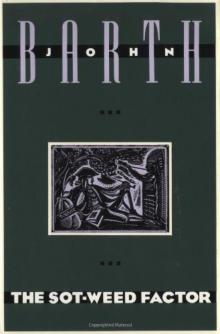 The Sot-Weed Factor
The Sot-Weed Factor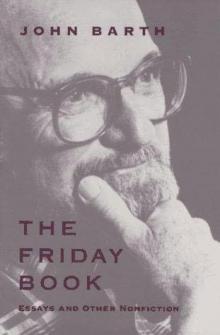 The Friday Book
The Friday Book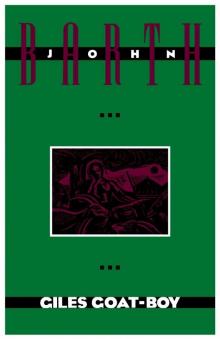 Giles Goat Boy
Giles Goat Boy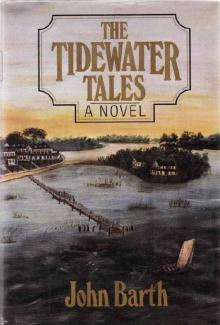 The Tidewater Tales
The Tidewater Tales The Development
The Development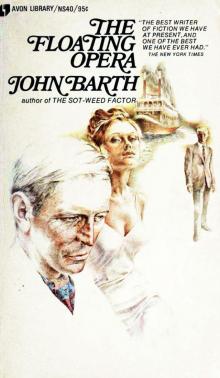 The Floating Opera
The Floating Opera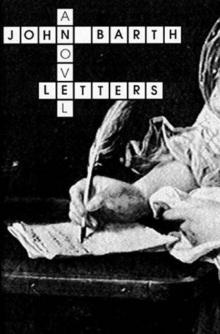 Letters
Letters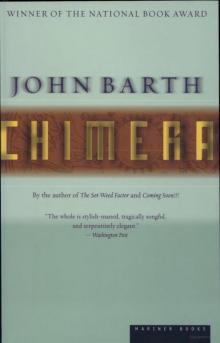 Chimera
Chimera Where Three Roads Meet
Where Three Roads Meet Every Third Thought
Every Third Thought